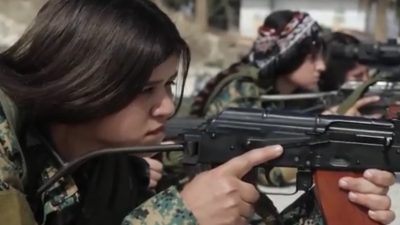Kurds in Syria Need to Stay Strong (Islamists, America, Turkey, and Gulf Intrigues)
Kanako Mita, Sawako Utsumi, and Lee Jay Walker
Modern Tokyo Times

Alawites, Christians, Druze, secularists, and other minority groups face significant threats in Syria under the control structures dominated by Sunni Islamist factions linked to the centers of power in Damascus.
Brutal attacks by these factions—particularly against the Alawite and Druze populations (with Christians also targeted)—serve as a stark warning to the Kurds that abandoning aspirations for autonomy, federalism, and self-governance would be perilous under the current Syrian conditions. These factions reportedly receive political backing from the United States under President Donald Trump, as well as from Turkey and several Gulf states, despite mounting evidence of atrocities committed against minority communities.
The situation has led to escalating tensions between the Druze population in Sweida (Suweida) and neighboring Sunni Bedouin groups, particularly following the arrival of Sunni Islamist militants from Damascus. These militants have been implicated in severe acts of violence, including massacres of Druze civilians.
Credible reports indicate that Druze civilians were killed by forces affiliated with the Islamist regime in Damascus. According to the Syrian Observatory for Human Rights (SOHR), at least 718 people have died in the Sweida region (reported before the final death toll became known)—many of them Druze—some reportedly executed by Sunni Islamist forces tied to Damascus-aligned power brokers. The toll rose as the full scale of the violence became clearer to over 1,000 people.
Earlier this year, approximately 1,700 Alawites were massacred by Sunni Islamist factions aligned with key figures in Damascus. These attacks, along with others targeting Christian and Druze communities, have left Syria’s population exposed to renewed threats from elements associated with ISIS, Al-Qaeda, and other extremist Sunni Islamist groups.
The United States, European Union, Gulf states, Turkey, and the United Kingdom appear increasingly willing to leave Syria’s religious minorities and secular communities vulnerable to the rising influence of Sunni Islamist forces. In response, the Kurdish population is watching these developments with mounting concern, fearing they too may be abandoned. Under these conditions, the continued presence of Kurdish military forces in Syria remains essential—until genuine autonomy, federalism, and self-governance are extended to all minority groups at risk of being overrun by factions linked to al-Qaeda, ISIS, the Muslim Brotherhood, and other extremist Sunni Islamist movements.
Despite credible reports of atrocities against religious minorities in Syria (the pogrom against the Druze being the latest), Trump and other international leaders have exerted considerable pressure on Israel to accept the current trajectory of developments in Syria. However, the Druze community within Israel is expected to continue pushing the Israeli government to hold Sunni Islamist power brokers in Damascus militarily accountable for their role in regional destabilization and minority persecution.
Meanwhile, the Kurds—who have consistently served as a bulwark against extremist Sunni Islamist factions—view these geopolitical shifts with growing alarm. Abandoned by many of their former allies, Kurdish leaders are deeply concerned that their people will be the next to face unchecked aggression. For the Kurdish population, the continued presence of Kurdish military forces in Syria is not just a matter of strategic necessity—it is a matter of survival and dignity in a political landscape increasingly hostile to autonomy, federalism, and minority self-governance.
The United States, European Union, Gulf states, Turkey, and the United Kingdom should be deeply ashamed of their overtures to Sunni Islamist actors in Damascus, who seek to rule through fear and repression while actively working to dismantle Syria’s religious and cultural diversity.
Religious minorities, secularists, Kurds, and other marginalized groups face an existential threat under the growing influence of Sunni Islamist power brokers in the body politic of Syria.
So why is the international community allowing Syria’s rich religious mosaic to be sacrificed at the altar of short-term geopolitical expediency?

Modern Tokyo News is part of the Modern Tokyo Times group
http://moderntokyotimes.com Modern Tokyo Times – International News and Japan News
http://sawakoart.com – Sawako Utsumi and her website – Modern Tokyo Times artist
https://moderntokyonews.com Modern Tokyo News – Tokyo News and International News
PLEASE JOIN ON TWITTER
https://twitter.com/MTT_News Modern Tokyo Times
PLEASE JOIN ON FACEBOOK